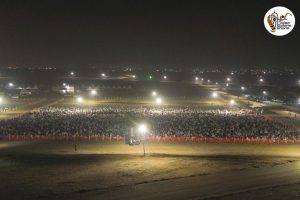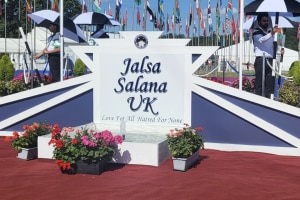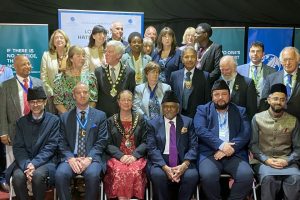
ROR Women’s Team
The hijab is a widely debated topic across the world, and more often than not, painted in a negative light, which leads to the discrimination of Muslim women who choose to express their faith and follow a Qur’anic injunction. The pressures of society, coupled with laws and restrictions about wearing the hijab, can present challenges for Muslim women – far from the type of oppression that the media portrays Muslim women to be facing by actually wearing the hijab.
In his address at the ladies’ section of Jalsa Salana Germany, His Holiness, Hazrat Mirza Masroor Ahmad (aba) spoke about exemplary pious women in Islam, who were ready to make every sacrifice for the cause of their religion, a slogan that Lajna [Ahmadiyya Women’s Auxiliary] recite in their pledge all over the world. His Holiness (aba) also spoke about the hijab – what it means to cover ourselves and how women should not have any type of complex in regards to their faith.
One group of ladies from France, despite the start of the hijab injunctions in 2010, defy all odds and are showing the world that the hijab is nothing to fear; it is a beautiful way of showing our strength and courage. Kara Toure, a member of the community since 1999 and Fatna Belarbi (Isha’at Secretary, France) spoke about what His Holiness (aba) had mentioned in his speech and also related this to the hijab ban in France.
‘Huzoor (His Holiness) (aba) has given us confidence that we should cover ourselves, we shouldn’t be afraid, we have to explain to others because they don’t understand what the hijab is. It is about our identity. They think that we obey to men by wearing the hijab and covering ourselves, but we have to explain to them that it’s our faith. We cover because it is in the Qur’an. We need to speak a lot about this via social media and articles.”
When asked about her feelings when the hijab ban happened in Paris, Kara mentioned, ‘They don’t ask women what we think about the hijab. Are we obliged to wear it? It’s not correct to impose this, that we have to remove the hijab. They think that we are forced to wear the hijab but ironically they are forcing us to remove it. I cannot remove it; it is a part of me.’ Fatna adds, ‘In France when we say it’s our choice [to wear the hijab] they don’t trust us’.
Thankfully, the ban has not affected either of the ladies significantly as they are not working in other organisations. However, Fatna relates that one of her family members voluntarily left her job due to the hijab ban as she could not wear it at work. These are inspirational sacrifices that women are making today to ensure that their faith and identity are not lost.
The sacrifices and courage of the pious women during the time of the Holy Prophet Muhammad (sa) coupled with the fortitude of modern-day Muslim women, and not forgetting the guidance and reassurance provided by His Holiness, Hazrat Mirza Masroor Ahmad (aba), is enough to free ourselves from any superiority complex. And Jalsa Salana is the perfect way to meet and connect with sisters of our community, such as Kara and Fatna, who with their stories, not only inspire but motivate us to educate the world about the hijab and Islam with confidence.
As stated beautifully by Fatna, ‘The more they ban, the stronger we become’.




Add Comment